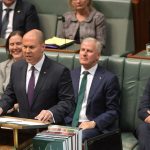Government gets B for effort on reforms, but will have to lift its game
The Abbott government recently held its Spring Repeal Day where legislation and regulation deemed unnecessary and costly is being cut. Cassandra Wilkinson says despite these efforts large deregulation opportunities remain.
The Centre for Independent Studies recently hosted Institute of Economic Affairs Director of Lifestyle Economics Christopher Snowdon who summed up the problem with regulation: “A lot of people are very good at doing benefit analysis”. Costs are easily forgotten. Especially non cash costs like time, forgone opportunities and sheer frustration.
Between 2010 and 2013 an Act of Parliament was passed every two days, adding 21,000 regulations to public, private and professional activities. Commenting on the Abbott government’s second Regulation Repeal Day, opposition spokesman Senator Joe Ludwig countered that the Gillard government had, “repealed over 16,000 acts, regulations, legislative instruments – without a fanfare” so in a spirit of goodwill let’s call it 5,000 additional rules.
All these rules add time, cost and confusion to daily life and deadweight losses across the economy. Elected with a commitment to cut $1 billion year in red tape, the PM has found $2.1 billion so far.
Ludwig has criticised the government for passing off the usual abolition of redundant provisions such as the Spirits Act 1915 as reform which he says in the usual course of events, “always takes care of itself. Old statutes will come up, get written off and get binned. You don’t need a flying squad.” As is often the case with politicians, he is a bit right and a bit wrong.
This round has delivered a few minor fixes, so that for instance cattle headed to the EU no longer need a green tag on their tail, but also some meat. A full list is here, but these are the top three:
- The biggest saving is from getting the commonwealth further out of environmental approvals. States and territories will be able to autonomously approve projects consistent with the Environment Protection and Biodiversity Conservation Act 1999 (EPBC Act) saving $426.3m
- The MyTax initiative will allow approximately 1.4 million taxpayers access to an automatically pre-populated electronic income tax return saving $156.0m
- The myGov service provides secure access to several departments. The clearest saving comes from allowing electronic mail from Centrelink, Medicare and Child Support saving the cost of posting 23 million letters saving $88.0m
However, large deregulation opportunities remain. Several can be found in the COAG Reform Council’s (CRC) final report on the National Partnership to deliver a Seamless National Economy [declaration of interest – I worked on this report].
At the outset of the NP, the Productivity Commission estimated that full implementation of the SNE reforms would reduce business costs by $4 billion a year and deliver productivity improvements capable of increasing GDP by up to $6 billion.
A good half of the original agenda remains incomplete, or implemented in letter rather than spirit. Nationally uniform OHS laws were not fully achieved despite estimated benefits of up to $480 million a year. Also incomplete are national consumer credit reforms estimated to be worth $1.5 billion to $4.5 billion per year back in 2008.
Properly deregulating the national electricity market will become more urgent once people realise how little saving they get from not paying the carbon tax. A more serious cause of rising prices has been regulatory gaming. Similarly, national transport regulation is a rich source of gains. The government gets a B for consistent effort, but will have to considerably lift its game to deliver transformative benefits to Australian consumers, employers and taxpayers.
Cassandra Wilkinson is External Engagement Manager with the Centre for Independent Studies (CIS). She works with the Directors and Executive to develop CIS’s community of supporters. Cassandra’s background is diverse, covering the not for profit sector, politics and the media. She has also held executive roles in the state and federal public sector and undertaken external affairs roles in business and the education sector. She has expertise in infrastructure, transport, public policy, public sector management, Australian contemporary arts and innovation.












